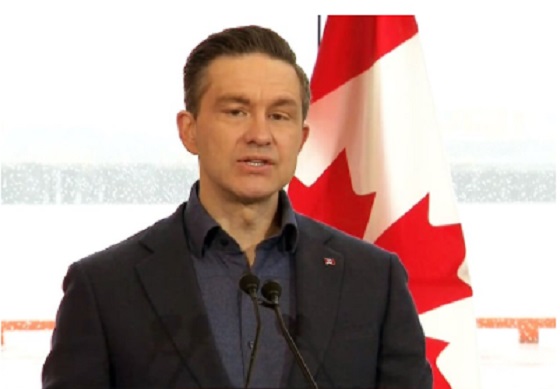Automotive
B.C. limits court experts in auto insurance to spur early settlements, savings

VICTORIA — The B.C. government is going to try and contain financial losses at its Crown-owned auto insurance corporation by reducing the use of experts in accident lawsuits.
The government has amended the rules for civil cases in the B.C. Supreme Court to limit the number of experts and the reports they write in lawsuits involving the Insurance Corporation of British Columbia, Attorney General David Eby said Monday .
Accident injury claims have increased 43 per cent in the past five years and the use of experts has contributed to a 20 per cent rise in the corporation’s injury settlements in the past year, Eby told a news conference.
The changes are designed to trim the excesses in the system, he added.
“It doesn’t advance any interest to have six-plus adversarial experts on a claim. It doesn’t advance any interest to have a $50,000 expense to resolve a $100,000 claim.”
Eby, who is also the minister in charge of the Crown corporation, said the agency is on track for a year-end loss of $1.18 billion, compounding the blow of last year’s $1.3 billion deficit. He described the financial situation left by the former Liberal government at ICBC as a “dumpster fire” last year.
Last week he said the financial situation at the public auto insurer is critical and getting worse, with losses of $860 million in the first nine months of this fiscal year.
The Trial Lawyers Association of B.C. said it supports measures to make the civil justice system fairer, faster and cheaper, but it criticized the government for acting unilaterally.
“Passing such consequential changes to our system of civil justice with no legislative debate is undemocratic,” the association said in a statement. “Time and again this government seems to favour ICBC’s financial interests over the legal rights of British Columbians, and this rush to pass restrictions on how victims of negligence must prove their cases at law is the most recent illustration of making car accident victims pay for reckless driving.”
Eby said he expects there will be legal challenges, but added the changes bring B.C. into line with other provinces that limit experts in injury claim cases from motor vehicle accidents. Australia and the United Kingdom have much tougher restrictions on the use of experts and expert reports, he said.
“We believe the balance we have struck between unlimited adversarial experts under the current system and the no adversarial expert rules of other jurisdictions will reduce the costs and delays associated with using duelling experts while preserving a party’s ability to get evidence in front of a court,” Eby said.
The changes mean the parties in injury claims cases are limited to the use of one expert and one report for claims of less than $100,000 and up to three experts and three reports for all other claims.
Eby said the courts will also be able to permit more court-appointed or joint experts at its discretion.
The changes start immediately on motor vehicle accident claims, he said. The government is also considering making the injury expert changes apply to all personal injury claims by Feb. 1, 2020.
“The challenge with the issue, as all issues on this file, is finding the right balance between protecting the interests of British Columbians injured in motor vehicle accidents and finding ways to make the current system work better,” Eby said.
The B.C. Utilities Commission approved ICBC’s request in January to allow for an interim basic auto insurance rate increase of 6.3 per cent.
A number of other cost-saving reforms are also being implemented starting April 1, including higher fines for repeat offenders and a payout limit of $5,500 for minor soft-tissue injuries.
Dirk Meissner, The Canadian Press
Automotive
Tesla Vandals Keep Running Into The Same Problem … Cameras


From the Daily Caller News Foundation
By Hudson Crozier
People damaging Teslas in anger toward their owners and Elon Musk aren’t picking up on the fact that the vehicles have multiple cameras capable of catching them in the act.
At least nine perpetrators have been caught on video keying, writing graffiti or otherwise defacing Tesla vehicles in parking lots across the U.S. in the month of March alone. Most have led to an arrest or warrant based partly on the footage, which Tesla’s “Sentry Mode” automatically films from the side of the unattended vehicle when it detects human activity nearby.
“Smile, you’re on camera,” Tesla warned in a March 20 X post about its Sentry Mode feature. Musk’s company has been working to upgrade Sentry Mode so that the vehicles will soon blast music at full volume when vandals attack it. The camera system, however, has not stopped an increasing number of vandals from singling out Tesla owners, usually in protest of Musk’s work in the Trump administration for the Department of Government Efficiency (DOGE).
One incident happened on March 29, the same day leftists coordinated protests around the country for a “Global Day of Action” against Musk. That Saturday also saw alleged instances of violence at protests. The demonstrations stemmed from an online call to action by groups such as the Disruption Project, which encourages activists to foment “uprisings,” find a “target’s” home address and other confrontational tactics.
Tesla’s press team did not respond to a request for comment.
One man allegedly caught on camera keying a Tesla SUV on March 24 apologized to the owner who confronted him in a parking lot in Pennsylvania, police and media reports said. The man faces charges of criminal mischief, harassment and disorderly conduct for allegedly carving a swastika onto the vehicle.
“I have nothing against your car, and I have nothing against you,” the suspect said while the owner filmed him in the parking lot. “Obviously, I have something against Elon Musk.” The man called his own behavior “misguided.”
The defendant’s lawyer told Fox News his “client is a proud father, long-time resident, and is currently undergoing cancer treatment” and that he would not comment publicly “pending the outcome of the case.”
One of the most aggressive acts caught by Sentry Mode was in the case of a man who drove an ATV-style vehicle into a Tesla on March 25. Texas police identified the man as Demarqeyun Marquize Cox, arrested him and said he allegedly gave two other nearby Teslas the same treatment while also writing “Elon” on them. The public defender office representing Cox did not respond to a voicemail from the Daily Caller News Foundation.
Tesla cameras also caught three other people in Florida, Texas and Arizona keying and smearing bubble gum on the vehicles in March. The three suspects named by police do not have attorneys listed in county records available for contact.
Many of the vandalism cases since Trump’s return have reportedly caused thousands of dollars in damage for individual owners. For example, the bubble gum incident in Florida brought $2,623.66 in costs, while another keying incident in Minnesota brought $3,200.
Some reported attacks on Tesla vehicles and chargers have gotten the attention of federal law enforcement, including cases of alleged firebombing or shooting.
Two other suspected vandals in New York, one in Minnesota and one in Mississippi have reportedly avoided arrest for now — with one owner declining to press charges — but were all seen on the Teslas’ cameras scratching up the vehicles. Police identified the Mississippi suspect as an illegal migrant from Cuba.
One Tesla owner in North Dakota ridiculed a man who allegedly carved the letter “F” into his Cybertruck in a Costco parking lot — as seen on the Cybertruck’s camera. The defendant faces charges of criminal mischief, and county records say he is representing himself in court.
“I can’t believe this guy is potentially ruining his life to follow a political ideology,” the owner told WDAY News.
“If you’re going to vandalize these vehicles, you’re going to get caught,” the owner said.
Automotive
Dark Web Tesla Doxxers Used Widely-Popular Parking App Data To Find Targets, Analysis Shows


From the Daily Caller News Foundation
By Thomas English
A dark web doxxing website targeting Tesla owners and allies of Elon Musk appears to be compiled from hacked data originally stolen from a massive ParkMobile app breach in 2021, according to records obtained by a data privacy group.
The site, known as DogeQuest, first appeared in March and publishes names, home addresses, contact details and other personal information tied to Tesla drivers and DOGE staff. Marketed as a hub for anti-Musk “creative expressions of protest,” the platform has been linked to real-world vandalism and remains live on the dark web. Federal investigations into DogeQuest are already underway, the New York Post first reported.
“If you’re on the hunt for a Tesla to unleash your artistic flair with a spray can, just step outside — no map needed! At DOGEQUEST, we believe in empowering creative expressions of protest that you can execute from the comfort of your own home,” the surface-web DogeQuest site reads. “DOGEQUEST neither endorses nor condemns any actions.”

A screenshot of the DogeQuest surface website captured on April 3, 2025. (Captured by Thomas English/Daily Caller News Foundation)
ObscureIQ, a data privacy group, compiled a breakdown of the data — obtained by the Daily Caller News Foundation — and determined 98.2% of records used to populate the site matched individuals affected by the 2021 ParkMobile breach.
Encouraging destruction of Teslas throughout the country is extreme domestic terrorism!! https://t.co/8TCNIbrQxA
— Elon Musk (@elonmusk) March 18, 2025
DogeQuest originally appeared as a surface web doxxing hub, encouraging vandalism of Teslas and displaying names, addresses, contact details and, in some cases, employment information for roughly 1,700 individuals. The site used stolen ParkMobile records along with data purchased from brokers, flagging anyone who had a Tesla listed in their vehicle registration profile, according to ObscureIQ’s analysis.
The platform — now operating as “DogeQuest Unleashed” via a .onion dark web address — has also published personal details of high-value targets including senior military officials, federal employees and private sector executives in Silicon Valley. A spreadsheet reviewed by the Daily Caller News Foundation indicates several individuals targeted work areas like cybersecurity, defense contracting, public health and diplomatic policy. DOGE staff and their families appear prominently throughout the data.

A screenshot of DogeQuest’s surface website, captured on April 3, 2025. (Captured by Thomas English/Daily Caller News Foundation)
No other reporting has yet tied DogeQuest directly to the ParkMobile breach, which impacted over 21 million users in 2021. The company, which facilitates cashless parking across the U.S., quietly disclosed the breach in April of that year, admitting that “basic user information” had been accessed. ObscureIQ’s research shows that exposed data included email addresses, license plate numbers and phone numbers — enough to triangulate identity when paired with commercial data brokers.
The company agreed to a $32 million settlement to resolve a class-action lawsuit stemming from the data breach. The lawsuit alleged that ParkMobile failed to secure its Amazon Web Services cloud storage, allowing access to the data. Although payment data were reportedly not compromised, plaintiffs argued the exposed information still posed serious privacy risks — a claim now reinforced by its use in the DogeQuest doxxing campaign.
Despite federal attention, the site has proven difficult to keep offline, as the dark web mirror incorporates anonymized hosting methods, frustrating law enforcement takedown efforts.
The Department of Justice charged three suspects last week linked to physical attacks on Tesla vehicles, charging stations and dealerships across multiple states, though it has not publicly confirmed any link between those suspects and DogeQuest. Meanwhile, the FBI has acknowledged it is “actively working” on both the doxxing campaign and a parallel rise in swatting incidents affecting DOGE affiliates.
-

 Alberta2 days ago
Alberta2 days agoMedical regulator stops short of revoking license of Alberta doctor skeptic of COVID vaccine
-

 International2 days ago
International2 days agoUN committee urges Canada to repeal euthanasia for non-terminally ill patients
-

 MacDonald Laurier Institute2 days ago
MacDonald Laurier Institute2 days agoRushing to death in Canada’s MAiD regime
-

 Bruce Dowbiggin2 days ago
Bruce Dowbiggin2 days agoBettman Gives Rogers Keys To The Empire. Nothing Will Change
-

 2025 Federal Election2 days ago
2025 Federal Election2 days agoPoilievre Will Bring in ‘One and Done’ Resource Approvals, and Ten Specific Projects Including LNG Canada Phase II
-

 conflict1 day ago
conflict1 day agoZelensky Alleges Chinese Nationals Fighting for Russia, Calls for Global Response
-

 2025 Federal Election1 day ago
2025 Federal Election1 day agoHarper Endorses Poilievre at Historic Edmonton Rally: “This Crisis Was Made in Canada”
-

 Energy2 days ago
Energy2 days agoEnergy group urges Trump administration to restock oil reserves









